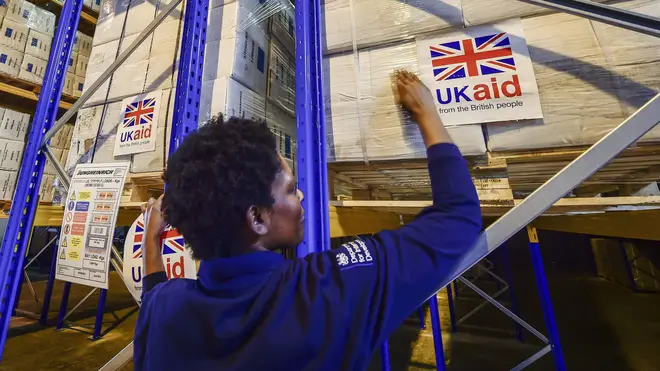
Matthew Wright 7am - 10am
16 July 2020, 23:28

The poorest in the world are "likely to pay the greatest price" by merging the Foreign Office with the Department for International Development (Dfid), MPs have said.
In a move criticised by a host of his predecessors, Prime Minister Boris Johnson told Parliament last month a "super-department" would be of "huge benefit" to the UK's overseas aid mission.
However, the Commons international development committee (IDC), in a new report, said the "impulsive" merger could reduce the UK's standing in the world and bemoaned the lack of consultation with the sector before the decision was announced.
The decision to scrap Dfid as a department in its own right after 23 years comes with the world gripped by the coronavirus pandemic and the UK's aid budget having to be slashed by more than £2 billion due to the resulting economic downturn.
The UK has legally committed to spending 0.7% of national income on aid, meaning that when the economy contracts, the budget also tightens.
Read more: NHS hero Captain Tom Moore to be knighted at Windsor Castle on Friday
Read more: Hospital in Boris Johnson's constituency re-introduces NHS staff parking charges

PM announces the Foreign Office and International Development Department will be merged into a new department
MPs on the IDC called the timing behind the creation of the Foreign, Commonwealth and Development Office (FCDO) "perplexing", adding: "Now is not the time for a major government restructure."
They urged Mr Johnson to continue to have a minister responsible for aid attend Cabinet, along with a committee to scrutinise overseas spending.
In the conclusion of its Effectiveness Of UK Aid report, published on Friday, the MPs said: "It is perplexing that the decision to merge Dfid into the FCO was taken in the midst of the Covid-19 pandemic.
"The decision puts the international response to Covid-19 in jeopardy at a time when global co-operation is needed.
"It is the world's poorest and most vulnerable who are likely to pay the greatest price."
Read more: Government should issue 'fulsome apology' to families caught up in NHS scandals
Read more: Kate and William praise workers during Norwich trip to mark NHS' 72nd birthday

James O'Brien's response to caller over cancelling foreign aid budget
Sarah Champion, a Labour MP who chairs the committee, said: "Dfid gives the UK considerable international standing and is something we should all be proud of.
"It is deeply disappointing that the Government failed to recognise these strengths as it made its impulsive move to have the FCO swallow up Dfid.
"Now we are on the brink of this expertise being lost and our international reputation being damaged beyond repair.
"The fact that there was no consultation, seemingly no evidence as to why this is a good idea, really lets down the communities that UK aid is there to support.
"The Foreign, Commonwealth and Development Office now has an enormous remit, and I sincerely hope development is not side-lined."
The committee also said the Government should present a statement to Parliament setting out an "evidence-led rationale" for the amalgamation, explaining the expected costs and financial benefits involved.
Poverty reduction "should continue to form a central part of the Government's international policy" with a focus on the "very poorest countries", the report added.
Shadow international development secretary Preet Gill said the report had published "more damning evidence" that the merger was "done on a whim."
"It was taken with no consultation, no evidence and no plan, but it is not too late for him to change his mind," she said.
Aid chiefs echoed the concerns raised and said the timing suggested the folding of Dfid had been politically motivated.
Oxfam GB chief executive Danny Sriskandarajah said: "The committee is right - the demise of Dfid is likely to do real damage to the world's poorest people and to Britain's international standing.
"British people expect our aid to be used for the benefit of those without clean water, medicines or food.
"But the timing and presentation of this merger clearly indicate that it was primarily about politics rather than becoming more effective in helping people to escape poverty."
Stephanie Draper, chief executive of Bond, the UK network of organisations working in international development, said: "Today's damning report calls into question not only the timing but the entire rationale of the Government's decision to merge Dfid and the FCO.
"We support the IDC's call for the Government to urgently present a statement to Parliament setting out an evidence-led rationale for this costly decision, and to begin meaningful consultation with the aid and development sector."
A Government spokesman said: "The new Foreign, Commonwealth and Development Office will place our world-class development programmes at the heart of our foreign policy.
"Combining the development expertise of DFID with the diplomatic reach of the Foreign Office will maximise the impact of our aid budget in helping the very poorest, while making sure we get the very best value for UK taxpayers' money in a world-leading department."